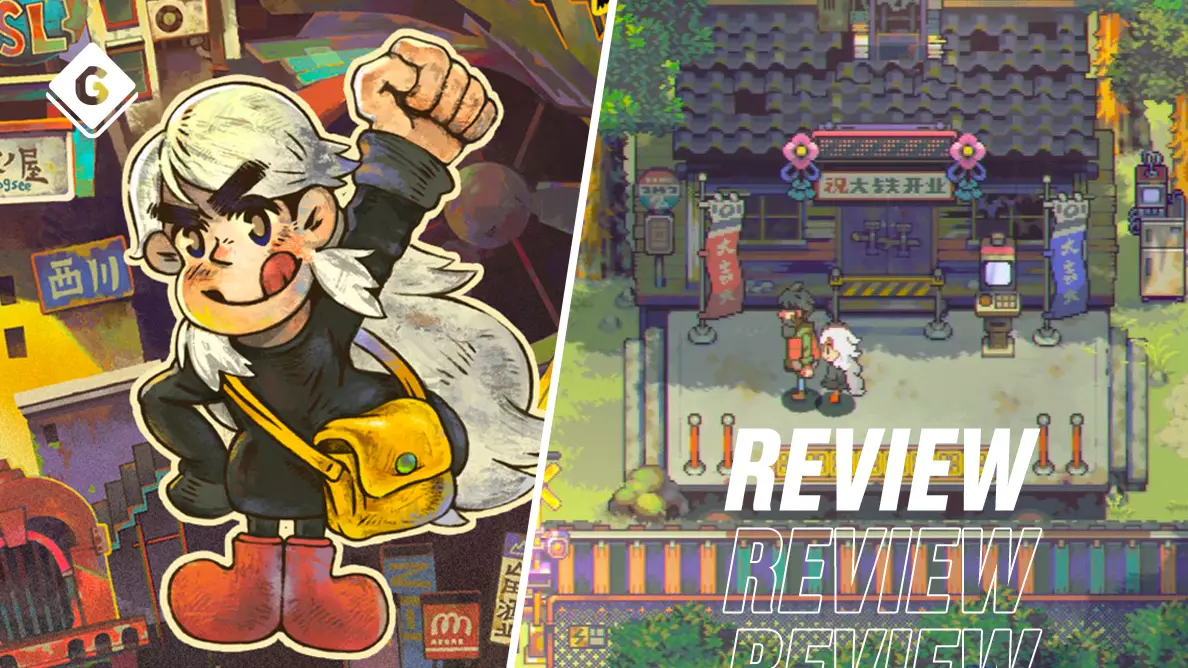
As I write these words, my time in the world of Eastward has finally come to a close. During my 30-hour adventure, I've explored ancient ruins and terrifying factories. I've made lifelong friends and bitter enemies. I've travelled across a disturbing, surreal, and achingly gorgeous world that never once stopped surprising me.
Eastward is, to put it simply, a truly wondrous piece of work. It is a sparkling, affecting, strikingly confident video game that I'm going to emphatically be recommending to friends and strangers alike for years to come. Even now, days after the credits have rolled, I'm walking around in a kind of stunned haze as I allow my love for Eastward and its characters to occasionally completely wash over me.
It might look like a standard love letter to classic RPGs on the surface, but there's so much more to Eastward than meets the eye. There are shades of The Legend Of Zelda in its combat, dungeons, and puzzle solving, and more than a hint of Mother 3 in its story, which effortlessly zips between childish wonder and post-apocalyptic nightmare at the drop of a hat. But it's the verve with which the game fuses together these elements and grafts on its own ideas to tell its own story that really impresses. The fact this is Pixpil's debut game, not to mention that the team is made up of just ten people, makes Eastward's many, many triumphs all the more remarkable.
Advert
Eastward puts players in the dusty boots of John, a man so quiet he makes Link look like the host of a late-night talk show. John lives and works as a "digger" in the relative safety of Potrock Isle, a tatty underground settlement constructed many years ago to escape the Miasma, a destructive force that has allegedly ravaged the world above.
John spends his time working the tunnels and taking care of Sam, a young girl he found deep (well, deeper) underground one day resting in a mysterious, unearthly pod. It's clear Sam isn't quite what she seems, and it's not long before her strange powers and insistence that there is still a world waiting beyond Potrock Isle come to a head.
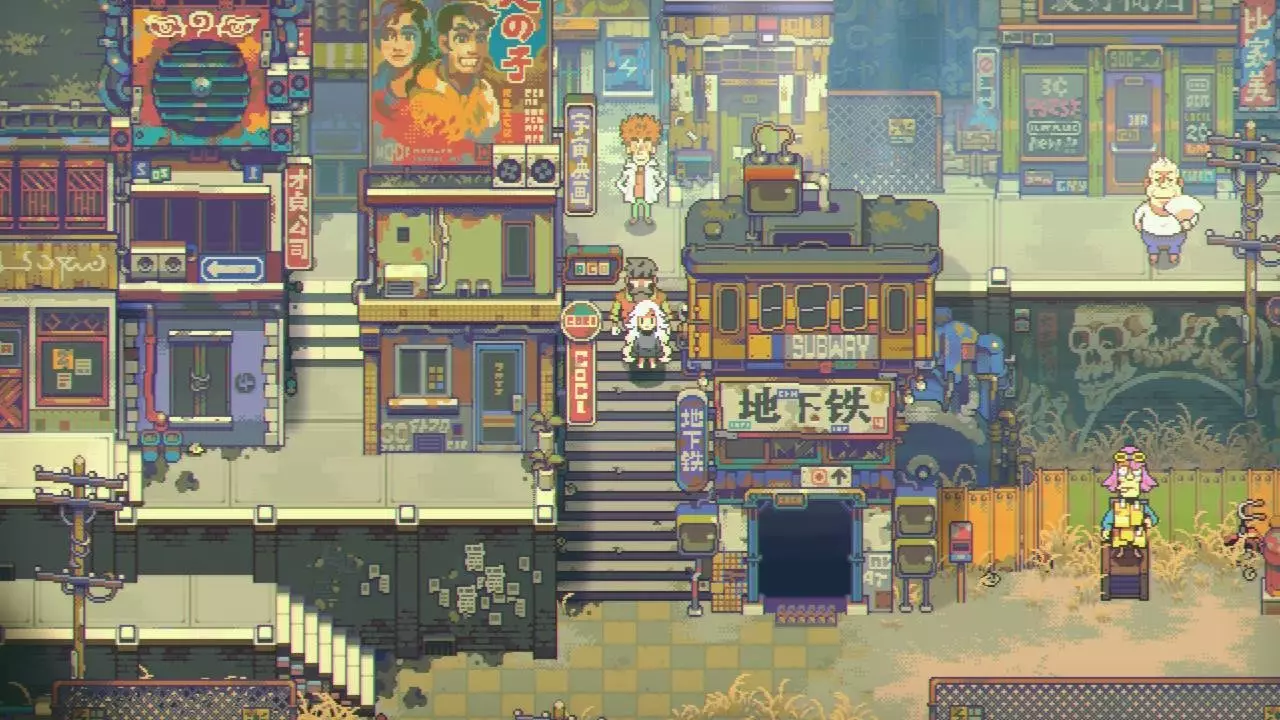
I can't imagine you'll be surprised to learn the vast majority of Eastward is spent navigating that world above, as John and Sam travel together and discover the truth about her powers, the Miasma, and the terrifying entity known as Charon.
Advert
Eastward's story is perhaps its greatest strength, so to reveal too much here would be to take away from so much of what makes the experience special. Suffice to say, Eastward isn't afraid to go to some pretty heavy places... but it never loses sight of its sense of humour or innate charm in doing so. It's a journey in every sense of the word, with richly drawn characters and charmingly distinct towns and cities that linger in the memory long after circumstances force John and Sam to get back on the road.
One of my favourite things about Eastward is the way in which it juggles utterly mundane slice-of-life stories with dungeon-crawling adventures. One moment John and Sam will be exploring the backstreets of the sprawling New Dam City in an effort to find the perfect ingredients for a cooking contest. The next, they'll be knee deep in zombie guts as they fight their way through a nightmarish glimpse at what the Miasma can do. A lesser game might have made these quieter, slower moments feel like inauthentic padding. In Eastward, it's all in aid of helping the player to connect with the world and truly fall in love with it so that those action-packed Zelda-esque moments feel all the more crucial when they arrive. It's a testament to the game's writing, I think, that it pulls this balancing act off so beautifully.
It also helps that Eastward is an astonishingly beautiful game that uses its vibrant and remarkably detailed pixel art to delicious effect. The Ghibli-esque post-apocalyptic world is reminiscent of the most vibrant Game Boy Advance titles, but modern graphical flourishes add an extra flair that really help bring scenes to life. In a world where everyone harps on about ray tracing and volumetric lighting, Pixpil proves in style that strong art direction is, and always will be, king. From junkyards filled with relics of a forgotten world to breathtakingly ramshackle cities packed with narrow streets and ancient billboards, each of the game's many areas impresses in its own way.
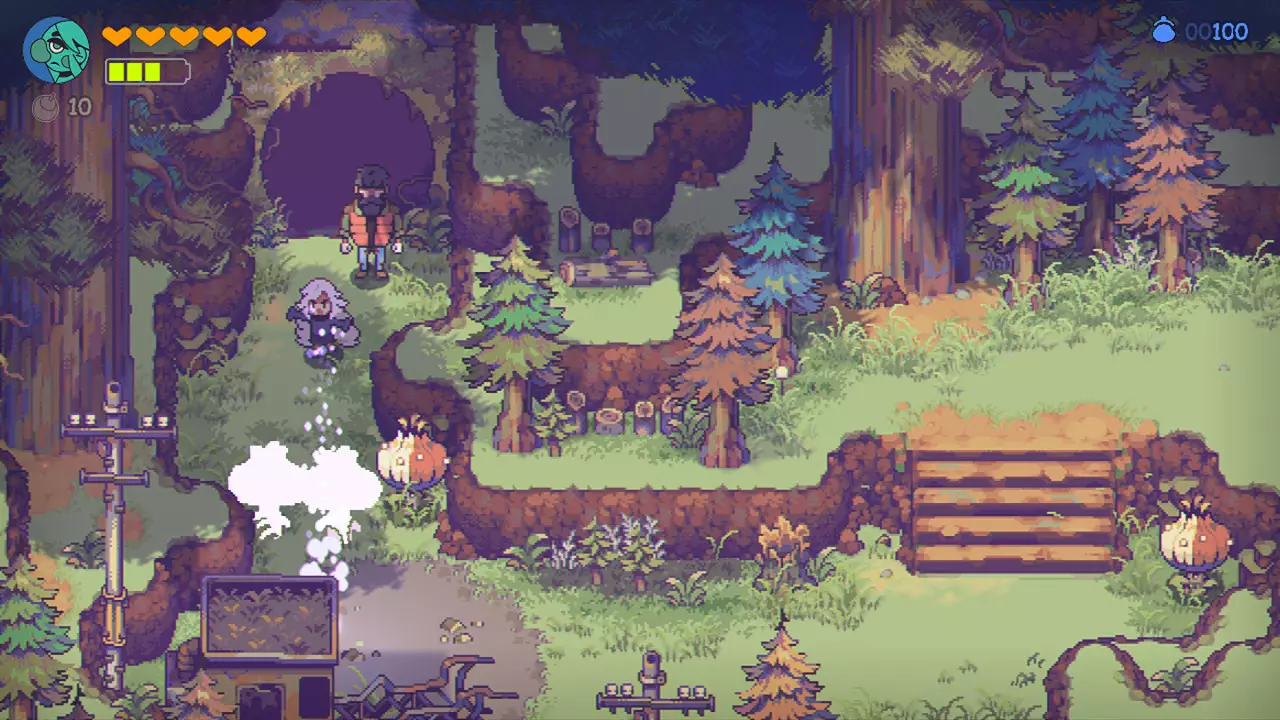
A special shout out must also go to Joel Corelitz's mesmerising soundtrack, which plays a vital role in punctuating the game's best moments, deftly flitting between grand adventure and creeping dread as and when the need arises. The theme for New Dam City has been stuck in my head for about a week now. I'll miss it when it finally worms its way out of my system.
Advert
When you're not helping John and Sam try to live a quiet life, you'll be out exploring the world and its many dungeons. In these areas you can switch between John and Sam at the tap of a button, which serves a purpose in both combat and puzzle solving.
In combat, Sam's powers can be used to freeze enemies in places while John wallops them with his weapon of choice: a massive frying pan. Puzzles are a little more involved, the pair can be split up at any time, which makes for some neat dual-route challenges that involve clever use of their unique abilities. John can smash through crates, bomb walls, and burn down deadly vines. Sam is able to sneak through small gaps and clear away deadly Miasma.
Many dungeons will see the two splitting up to help one another out before reconnecting, and each unique area tends to be built around a new mechanic or item. It's very, very rare that Eastward's ideas outstay their welcome.
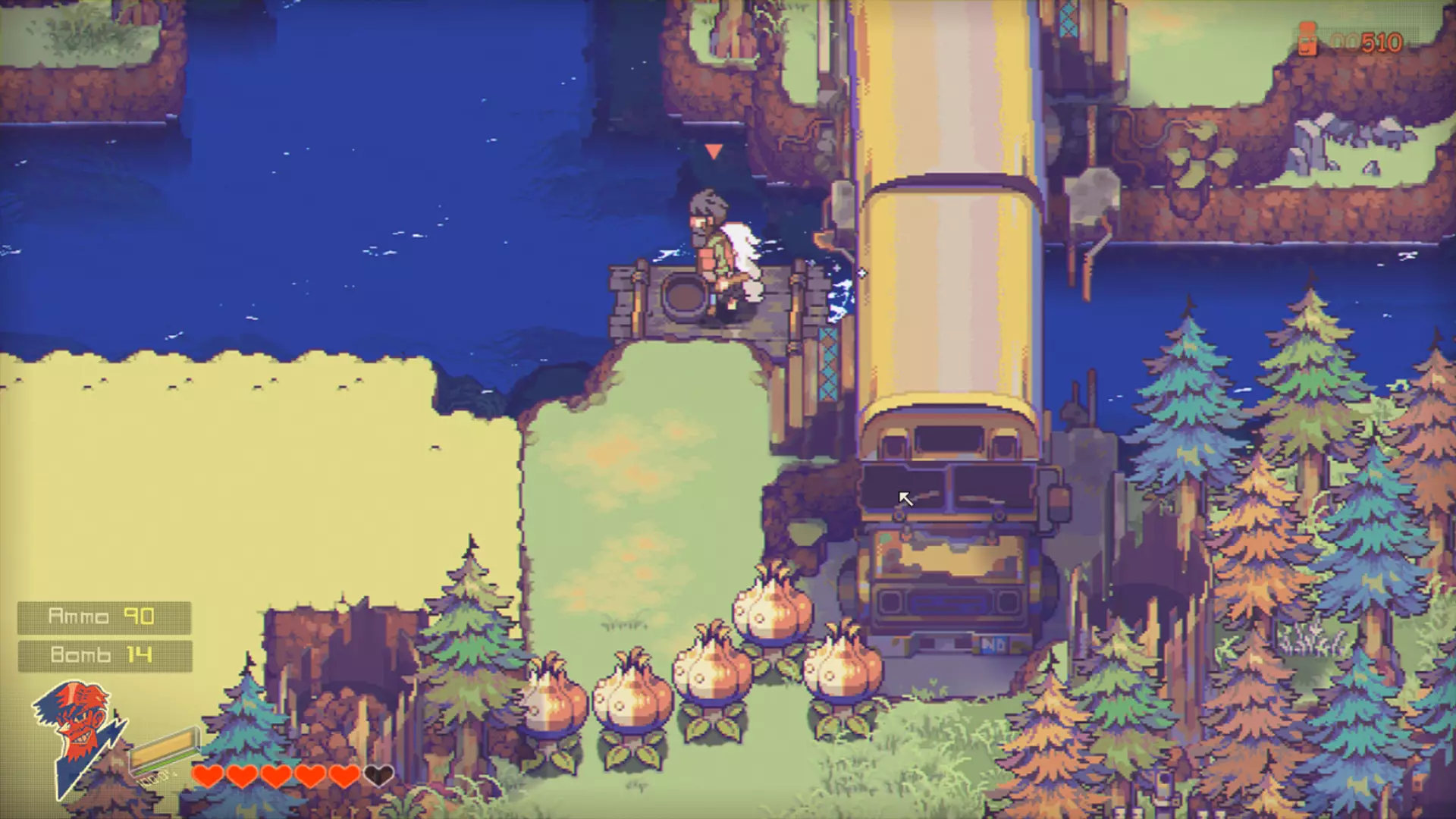
There are also plenty of optional areas to explore, secrets to find, and incredibly useful upgrades that all but the keenest of eyes can miss if they're not careful. Oh, and Pixpil has only gone and built an entirely separate RPG within Eastward as a minigame. It plays just like the classic NES Square Enix titles, and it's excellent. I spent two of my first three hours with Eastward just messing around with it before I remembered I had a game to review. Oops.
Advert
Combat can occasionally be a little clunky, unfortunately. While John's melee combat typically has a satisfying heft to it, the lack of a dodge button means it's all too easy to become overwhelmed by large enemy mobs later in the game. Many of the ranged weapons you pick up later are also a little tricky to aim with, meaning I'd walk into most encounters and simply thrash around wildly with my frying pan like Gordon Ramsay in a one-star restaurant.
The game's approach to replenishing health can also be a massive pain at times. Eastward has a delightful Breath Of The Wild-style cooking system in which you can combine ingredients you've found or purchased to make a variety of dishes that can restore health and even grant temporary buffs.
Naturally, it's important to make sure you're well stocked before heading out on any adventure, but it's all too easy to end up at the very end of a dungeon about to face down a boss having already used all your items, and no easy way to top up your hearts. The scarcity with which enemies drop hearts or ingredients usually means the best course of action is to trudge all the way back through a dungeon and to the nearest town, where you can top up on dishes and then make your way all the way back to where you just were. In these instances, fast travel or shortcuts might have been helpful.
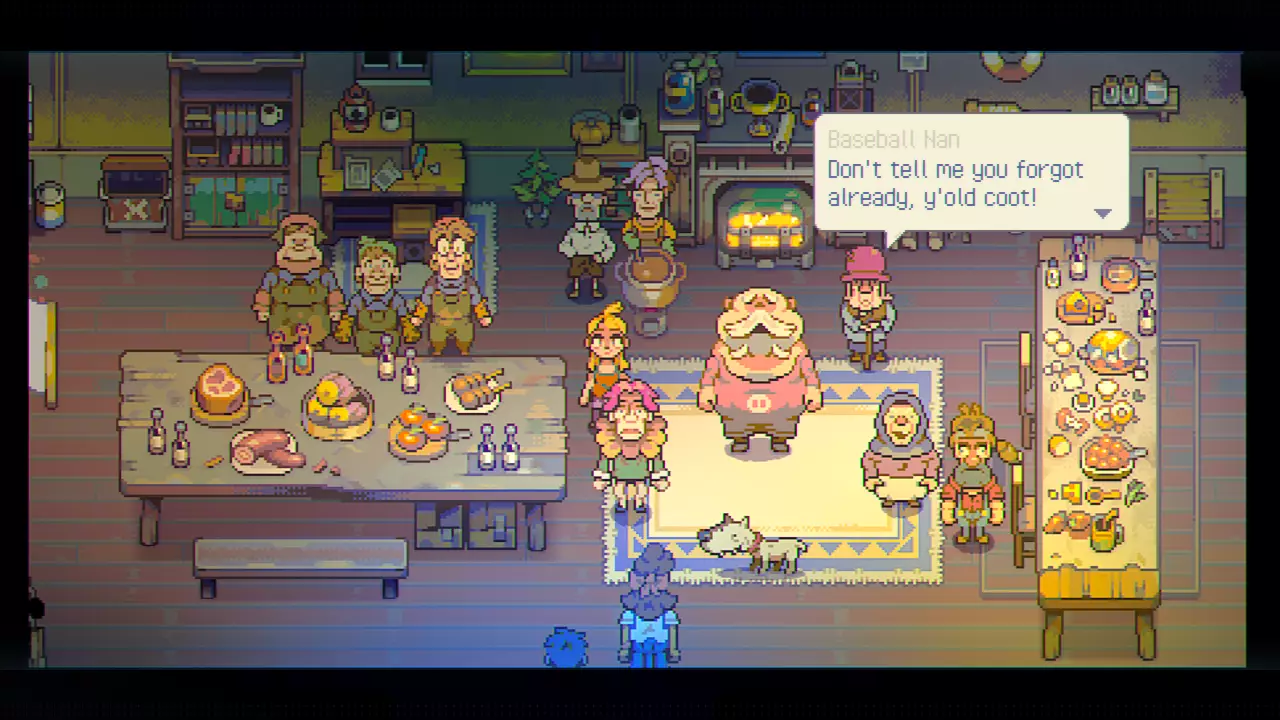
But these issues are nothing more than minor bumps in the road on a journey that I would urge everyone to take. Eastward feels comfortably familiar and strikingly fresh all at once, remixing the best elements of classic RPGs to produce something bold, brilliant, and altogether new. I can only hope that Pixpil has further stories to tell in this world, because it's certainly not one I'm ready to say goodbye to.
Advert
Pros: Gorgeous pixel art, unforgettable story and characters, excellent world design
Cons: Occasionally clunky combat, some irritating backtracking
For fans of: EarthBound, The Legend Of Zelda: The Minish Cap, Final Fantasy VII
9/10: Exceptional
Eastward is available on September 16 for Nintendo Switch and PC via Steam (version tested). Code for review was supplied by the publisher. Find a guide to GAMINGbible's review scores here.
Featured Image Credit: PixpilTopics: Review, Nintendo, PC, Reviews, Indie Games